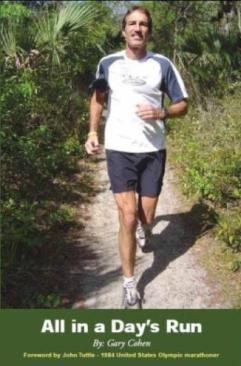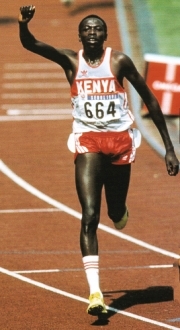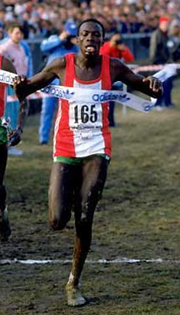|
|
|
 garycohenrunning.com
garycohenrunning.com
be healthy • get more fit • race faster
| |
|
 
"All in a Day’s Run" is for competitive runners,
fitness enthusiasts and anyone who needs a "spark" to get healthier by increasing exercise and eating more nutritionally.
Click here for more info or to order
This is what the running elite has to say about "All in a Day's Run":
"Gary's experiences and thoughts are very entertaining, all levels of
runners can relate to them."
Brian Sell — 2008 U.S. Olympic Marathoner
"Each of Gary's essays is a short read with great information on training,
racing and nutrition."
Dave McGillivray — Boston Marathon Race Director
|
 |


|
| John Ngugi won the Gold Medal in the 1988 Olympic 5,000 meter run in Seoul, Korea by breaking away from the pack early, building a big lead and maintaining a huge gap of 30 meters at the finish. He was the first male athlete to win the World Cross Country Championships five times which he did in 1986 in Switzerland, 1987 in Poland, 1988 in New Zealand, 1989 in Norway and 1992 in Boston. John’s win in 1989 by 28 seconds is by the largest margin to date. In 1986 he led Kenya to their first World Cross Country team victory and kicked off 18 years in a row of Kenyan team wins from 1986 to 2003. He won at 5,000 meters in the 1987 All-Africa Games held in Kenya. John first showed his talent in winning the 1500 meters at the 1985 East and Central African Championships in Cairo, Egypt. John started the John Ngugi Foundation in 2004, and its principal partner, the Mt. Kenya Development Center helps children with learning and sports, as they complement each other and create more wholesome individuals. To find out more about his foundation’s efforts and to consider making a donation please visit http://www.mktdchampions.com/ John was kind enough to respond to these questions via e-mail from his home in Kenya in late June, 2014 where he resides with his wife and two sons. |
|
| GCR: | Thank you, John, for consenting to this interview as it is very much appreciated. First, it has been over a quarter century since your Gold Medal performance in the Seoul Olympics at 5,000 meters. How exciting was it for you that day and how has being an Olympic Gold Medalist continue to impact your life? |
| JN | The Seoul Olympic Games remains one of my best performances in 5000 meters. It was such a memorable interesting event which I knew I would emerge the top position. Having achieved a gold medal performance has been of much benefit in my life, uplifted my moral in athletics and life in general. This has been of benefit both to me and the society at large, as I have helped and encouraged other people and upcoming athletes understand they can do it too and perform the best in their own different fields of calling. In other words, determination, working hard, much effort and hope will give them success as this is what helped me throughout my athletic career. |
|
| GCR: | In 1987 at the World Championships 5,000 meters you used front-running tactics before fading to twelfth place. When you used the same tactics in the Olympics, do you think your competitors didn’t take you seriously based on the year before, or were you just that much stronger? |
| JN | My competitors always had dirty tricks on me and a good finishing kick. In 1987, my running skills were minimal and I thought running in front of the others was my best option, little did I know I was to be defeated by eleven of my competitors Most of them criticized me saying my skills came from the bush. My Friend Domingos Castro from Portugal mocked me telling me it wasn't a cross country race. |
|
| GCR: | The Olympics is such a festival of bringing together the athletes and people of the world for great sporting competition. Did you march in Opening and Closing ceremonies and get to watch much other competition in your sport or other sports? |
| JN | Yes, I marched in the Opening and closing ceremonies and watched other sports too. |
|
| GCR: | You were the first male athlete to win the World Cross Country Championships five times which you did in 1986, 1987, 1988, 1989 and 1992. How tough is it to win since you face all distance runners rather than their being split up in several distance races? |
| JN | Kenya Athletics Trials are the hardest and it’s not that easy to defend a title in Kenya. It only takes wisdom, courage and discipline to win. |
|
| GCR: | Since then Paul Tergat has won five titles while Kenenisa Bekele has won six times. How is it to be included with these other two men as the three greatest World Cross Country Champions? |
| JN | It's such an extremely good feeling and experience. I am proud to have won five times the World Cross Country title. |
|
| GCR: | You started the John Ngugi Foundation, so that you can help other children who had difficult beginnings like you. The foundation helps children with learning and sports, as they complement each other and create more wholesome individuals. How has your racing success and visibility in the running world helped your foundation to contribute more rapidly to those in need and how can others help? |
| JN | The John Ngugi Foundation and our principal partner, Mt. Kenya Talents Development Centre, are helping many poor talented children discover their talents across Kenya. We seek to tap enormous undiscovered talent in the county, through working with schools and the community. After identifying the talent, we will provide training in our well-equipped residential camp. We rely on sponsors, partners, and volunteers to achieve our objectives; your support and of those who read this in this noble cause is highly appreciated. This can be through: 1) Sponsoring the Foundation to enable it to organize regular athletic competitions, while tapping and developing talents and 2) Funding the construction and running of the Mt. Kenya Talents Development Centre. |
|
| GCR: | Let’s talk a bit about each of your World Cross Country wins. First, in 1986 in Switzerland your 35:32.9 time edged Abebe Mekonnenof Ethiopia by only two seconds as he finished in 35:34.8, with your countryman, Joseph Kiptum, close behind in 35:39.8. What was your race plan, how were the course and weather and how did the race play out tactically? |
| JN | In 1986, I was very new in running, I didn’t expect to win. I struggled a bit and then decided to run in front. Abebe Mekonnen at some point controlled the pace came in front. I never gave up; during the last minutes I sprinted and won the race. |
|
| GCR: | The next year in 1987 in Poland you narrowly beat your countryman Paul Kipkoech as you both were timed in 36:07 and no one else was within 40 seconds of the two of you. How tough of a race was this, did either of you establish more than a short lead at any time and how hard was it to pull out the victory? |
| JN | It was one of the hardest cross country races, taking into consideration I had just recovered from an operation on my knee. The race was hard, muddy weather and too cold. An athlete from the race left a shoe in the mud if you view the clip well. It was a race between me and Paul Kipkoech who used front running tactics. At some point, after being one second behind, I flipped back to my top position. That race had a lot of conflicts, even from my coach. But I managed to sprint the last minute and won the race. |
|
| GCR: | Speaking of conflicts, on top of the toughness of the race, what about the selection process to make the team that year and disagreements amongst other runners and coaches about your inclusion on the team? |
| JN | I was 77th position during Kenya Trials. The Athletic Kenya secretary fought hard for me to be included on the team so that I could defend my title, since he believed in me and my potential. Some runners in the team threatened to boycott if I was to be included in the team, but their threats didn’t bear fruits. |
|
| GCR: | You battled against Paul Kipkoech again the next year in 1988 in Auckland, New Zealand, but it wasn’t as close as your 34:32 time was well ahead of his 34:54. Were you just in much better shape, was he off form and was this an indication of your readiness for the Seoul Olympics later that year? |
| JN | Yes I was in great shape that time and was ready and quite focused for the Olympic Games. |
|
| GCR: | Your fourth straight victory in Norway in 1989 was your most dominating as your 39:42 win was 28 seconds ahead of runner up Tim Hutchings of the United Kingdom. Were you just so ‘on your game’ that you were off the front of the pack and no one could race with you? |
| JN | Yes, at that time I was also in great shape, stayed quite focused and used front running tactics. But it was not easy as I had to use my long strides to beat Tim Hutchings and Steve Moneghetti. In Norway we received royal treatment that I will cherish all of my life. We were treated like true celebrities of the sport with an open-air carriage ride from the airport. |
|
| GCR: | The next two years injuries kept you from defending your titles. What exactly were the injuries you had and how difficult was it to come back? |
| JN | I had knee injury which was at the back of my knee and it wasn't improving despite treatment at all so I decided to go to the UK for further specialized treatment. After three months or so I recovered and was back in shape and winning ways. |
|
| GCR: | In 1992 you won your fifth title in Boston on a snow-covered course on a cold, winter day by 12 seconds over Kenyan William Mutwoi. How tough was it running in those conditions and how gratifying was it once again to be on top of the podium with another World title? |
| JN | It was one of the toughest races, the snow was all over and it was very cold, but I found myself to be the runner of all seasons. William Mutwol was in great shape too. I always enjoyed difficult conditions and there was a lot of snow, almost ankle deep and a tough hill. I like such conditions and that is how I won the title. It was my greatest course and crowning achievement. I will never forget winning that day in Boston. |
|
| GCR: | Stepping back a couple of years, in 1990 at the Commonwealth Games you tripped and fell after two laps and were gapped by about 35 meters, but caught the lead group and led yourself by 40 meters at the bell lap. Somehow Andrew Lloyd from Australia caught and outkicked you by only 0.08 seconds. Was this result extremely disappointing or was it just time to congratulate Lloyd on a great finish? |
| JN | In the 1990 Commonwealth Games I felt disappointed when I tripped off. I made a sprint to the front, but never expected Andrew Lloyd to be near me. I guess he used good tactics to beat me henceforth; it was time to congratulate him for his victory. |
|
| GCR: | There has been discussion about what happened in 1993 when you didn’t take an unannounced out-of-competition drug test, received a four-year suspension and contested the ruling resulting in the ban being reduced, but so much time has elapsed that your fitness had declined and your career never recovered. What are the main points of your case that you would like to share and how do you feel about athletes who have used performance enhancing drugs over the years? |
| JN | This was the worst season of my career, and at some point I blamed Athletics Kenya for lack of information on out of competition drug testing. I was clean on doping my entire career. I feel sorry for those runners using drugs knowingly or unknowingly, and my advice is for them to stop and start running clean. |
|
| GCR: | We’ve talked about your racing all over the world in places you never could have dreamt about visiting as a child. How was it getting used to all of the international travel that is part of being a top athlete? |
| JN | At first it was not easy, but I got used and I started enjoying travelling and meeting new people from all walks of life. |
|
| GCR: | Let’s look back at your childhood and how your circumstances shaped you as a person and runner. |
| JN | I came from a poor family and I used to walk to school, about 20 kilometers (note – about 12 miles) to and from school, so part of this hard life played part in my running career. We played soccer with balls made of polyethelene papers and we did some swimming in a river. We also played a hunting game with friends and relatives where we would use our dogs to capture game in the shortest amount of time. My brother and I had eight dogs so we would win with as many as five catches while others would only have one or two. My life was difficult as we only earned a living through agriculture, cattle rearing and seasonal harvesting. |
|
| GCR: | What type of physical activity did you to help your family with chores and daily tasks? |
| JN | Despite my poor back ground, we earned a living through farming. In addition to my walk/run to and from school, when I was home after school I helped in looking after cattle sheep and goats, farming-digging, harvesting and watering crops on our family land. |
|
| GCR: | When did you take up running as a sport, which coaches and runners influenced you and did racing success come early? |
| JN | My running career began in 1978 when I was in Primary School. We used to have inter-school competitions and I used to win in each competition, Due to my successive athletic career I was recruited in the Kenya Army. My Coach was Stephen Mucheru. He played a big part in my running career and this helped me to run on an international level. My inspiration came from the likes of Henry Rono, Wilson Maina, Kipckoge Keino and others. |
|
| GCR: | Did you do much specific hill training and hill repeats or were hilly courses just part of your usual running routine? |
| JN | Yes, every Wednesday I was doing hill work. I did about 40 minutes hill work. It was part of my training program. |
|
| GCR: | What did you do for your typical weekly training? |
| JN | This is a sample of my weekly training which included three training sessions per day on some days: Monday: Morning - 1:20min long runs - mostly 21Km; 10:00 to 12:00 – Recovery; Evening - Easy runs of 40 minutes to one hour. Tuesday: Morning – 45 minute run; 10:00 to 12:00 – Track session; Evening - Easy runs of 40 minutes to one hour. Wednesday: Morning – Hill work; 10:00 to 12:00 – Hill work or speed session; Evening - Easy runs of 40 minutes to one hour. Thursday: Morning – Speed work; 10:00 to 12:00 – Speed work; Evening - Easy runs of 40 minutes to one hour. Friday: Morning – Moderate runs; 10:00 to 12:00 – Recovery; Evening - Easy runs of 40 minutes to one hour. Saturday: Morning - Long Runs from 21 to 30 kilometers; 10:00 to 12:00 – Speed work; Evening – Recovery. Breakfast was either water or energy drinks. Lunch was food with starch and protein and a vitamin. |
|
| GCR: | Were there any stamina and speed sessions that stand out as vital in your training? |
| JN | This is a speed work session at the range at 100% for me. I would complete the following: 200 meters: 30.0; 800 meters 1:52 - 1:59, 1,500 meters 3:45 - 3:56; 3,000 meters 8:10 - 8:15; 5,000 meters 13:45 - 14:00; 10,000 meters 29:01 - 32:00. This is one is complete course where we started from 200 meters to 10,000 meters and back vice versa, meaning two full sets of this training. |
|
| GCR: | Who were some of your favorite competitors for their toughness or ability to push you to another level? |
| JN | Some of my favorite competitors were Said Aouita, Joseph Kiptum, Castro Domingo, Tim Hutchings, Dieter Baumann, Yobes Ondieki and Abebe Mekonnen, among others. |
|
| GCR: | You come from humble beginnings and now you seek to help others who come from similar backgrounds? How rewarding is it to use your talents and visibility in the sport of running to help others? |
| JN | It’s always rewarding and a blessing to help the less fortunate in our community. For example, this year we donated shoes to Maisha Mema Children`s Home in Soweto slum in Nairobi while motivating and tapping talents. The shoes were donated to us by Shoes for Planet Earth in Australia. |
|
| GCR: | What advice do you have for younger runners to improve consistency, minimize injuries and reach their potential? |
| JN | The best advice I would give to young athletes is to train hard and stay focused, and avoid over training. Rest days should be part of their training program so that they can minimize injuries. Finally, always seek advice from your coaches or even top runners. |
|
| GCR: | What do you do now for fitness and what goals do you have for yourself in the future in terms of health, fitness and helping others? |
| JN | Fitness is not a big deal to me. I practice each morning with the help of my three boys. They are my inspiration in everything I do. The eldest, Stephen Ngugi, helps me in the John Ngugi Foundation and Mt. Kenya Talents Development Centre. He has a strong passion in sports and business. |
|
| GCR: | What are the major lessons you have learned during your life from starting in a small village, the discipline of running and adversity you have encountered that you would like to share with my readers to help inspire them to do their best? |
| JN | Life is what you make it look like. God has given us all different talents. We only need to utilize our talents wisely. |
|
| | Inside Stuff |
| Hobbies/Interests | Running |
| Nicknames | ‘Isuzu,’ meaning very fast |
| Favorite movies | Christian movies |
| Favorite TV shows | Super Sport |
| Favorite music | Classic |
| Favorite books | IAAF yearly books |
| First cars | Datsun, Toyota 100 |
| Current car | Subaru |
| First Job | Farmer |
| Family | I am married with two boys, Stephen Kamau and James Wahome |
| Pets | One cat |
| Favorite breakfast | Milk and sweet potatoes |
| Favorite beverages | Milk and water |
| Running heroes | Henry Rono, Wilson Maina and Kipckoge Keino |
| Greatest running moment | When I won Gold in the Olympics |
| Worst running moment | When I was 77th position during the Kenya cross country trials |
| Childhood dreams | I wanted to be Olympian and a legend |
| Funny memories | When I attended the Churchhill comedy show, and was live on Kenya national TV, Nation TV |
| Embarrassing moment | When I forgot to pick up my son, Stephen, from school |
| Favorite places to travel | Across Kenya - Nyahururu, Nyeri, Mombasa and Naivasha |
|
|
|
|
|
|